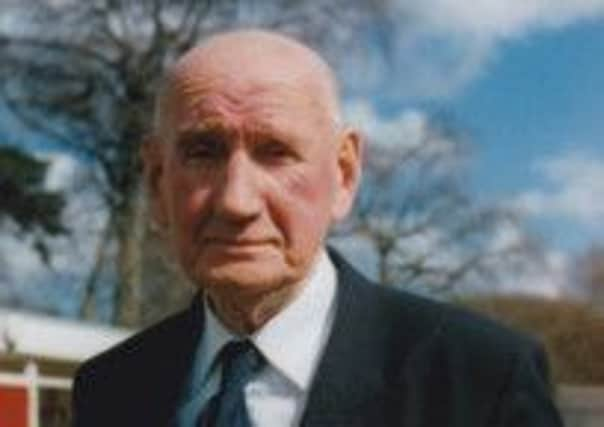Obituary: Alex Wilkie, policeman and head stocktaker


There was no mysterious secret to Alex Wilkie’s longevity; becoming a centenarian was just sheer luck, he maintained.
And he evidently had plenty of it, having lived through the Great War and survived the London Blitz, enjoyed a career as a Metropolitan Police officer, a stint in the brewing industry and become a popular after-dinner speaker, still wise-cracking at 95.
Advertisement
Hide AdAdvertisement
Hide AdOn only one occasion of note did his luck threaten to run out when, having proposed to his girlfriend in Edinburgh before joining the Met, he wrote two years later to say the engagement was off. She replied emphatically that indeed it was not and they married soon afterwards, an event that he acknowledged was the best thing he ever did.
He had only joined the force because steady jobs were difficult to come by when he was a young man in Scotland during The Depression of the 1930s. But he and his young wife threw themselves into life in London, living each day during the Second World War as if it were their last.
He spent 25 years with the Met, accumulating eight commendations for catching thieves during his time as a constable before transferring to the courts where he saw all human life – from drunks and wild women to murderers: “If you didn’t have 20 girl prostitutes appearing before the court that was a poor day,” he once said.
Born in Edinburgh’s Montague Street, he was the second youngest of six children to brass finisher Thomas Wilkie and his wife Mary. Aged four, he moved with his family to Watson Crescent and attended Merchiston School, joining North Merchiston Boys Club, where he became captain of prefects and enjoyed a variety of sporting activities including football, snooker and hillwalking.
But by the time he was 14 he had left school and also suffered the death of his mother. He began work with the North British Rubber Company but continued to educate himself through a home correspondence course with a college, gaining a certificate that helped him secure entry to the Metropolitan Police in 1932, at the age of 23.
He had met his future wife, Betty, at a Boys Club dance when he was 18 and, despite him having briefly got cold feet, the couple married at The Plaza in Edinburgh’s Morningside in 1934. Wilkie returned to London with his wife, who worked as a counter clerk at the post office in The Strand, and they set up home in Peckham.
By 1939 they were living in police quarters in Camberwell and on the outbreak of the Second World War Wilkie was transferred to Marlborough Street Magistrates’ Court in Soho, close to the London Palladium. The bombing was relentless and they had a narrow escape when their flat in Camberwell was damaged by a blast while they were in an air raid shelter.
Wilkie, who spent 14 years in Soho and also served at Acton and Marylebone Magistrates’ Courts, was promoted to sergeant warrant officer in 1950 and two years later the family, which now included a young daughter, moved from Brentford to Greenford, Middlesex. He commuted into London for further five years before retiring in 1957.
Advertisement
Hide AdAdvertisement
Hide AdA subsequent move to Bushey, Hertfordshire, heralded a different working life when he took over the running of a Victoria Wine shop. He also provided an outside bar service, in particular for the Boulting Brothers, the identical twin filmmakers John and Roy, and met many stars from Elstree Film Studios.
The family returned to Edinburgh in the late 1950s, buying a house near the Pentland Hills.
He took at job as a stocktaker at Drybrough’s Brewery and was promoted to head stocktaker in 1964, a demanding role but one that suited his experience of handling thousands of pounds in fines during his court days. On retiring from there he worked as a stocktaker/superviser for the Stewart Trust and did not give up work completely until 1982, at the age of 83.
Since his days at the Boys Club sport had remained important aspect of his life. During the 1930s he played in the Surrey Senior League, turning out for the semi-final of the English FA Amateur Cup at Wimbledon in 1935. They lost 2-0 to local rivals Dulwich Hamlet.
And when he moved back to Scotland he became involving in bowling, serving as president of Currie Bowling Club in 1965 and 1966, and later enjoying more than 25 years as honorary president.
By the time he was in his 60s he had built up a strong reputation as an after-dinner speaker, performing at least half a dozen times a year at various events. For his 95th birthday he did a stand-up show at his bowling club as the Reverend IM Jolly, earning him the title of Edinburgh’s oldest comedian.
After reaching his century, which was marked by an award from the Metropolitan Police Commissioner, he took part in a study of centenarians by Surrey University, sharing the story of his long life and his belief that it had been all down to good fortune.
Widowed some 25 years ago, he is survived by his daughter Jennifer, grandchildren Paul and Debbie and six great-grand-children.